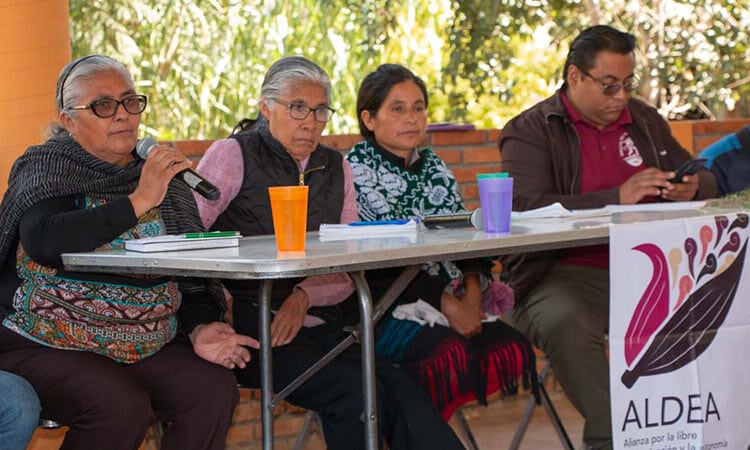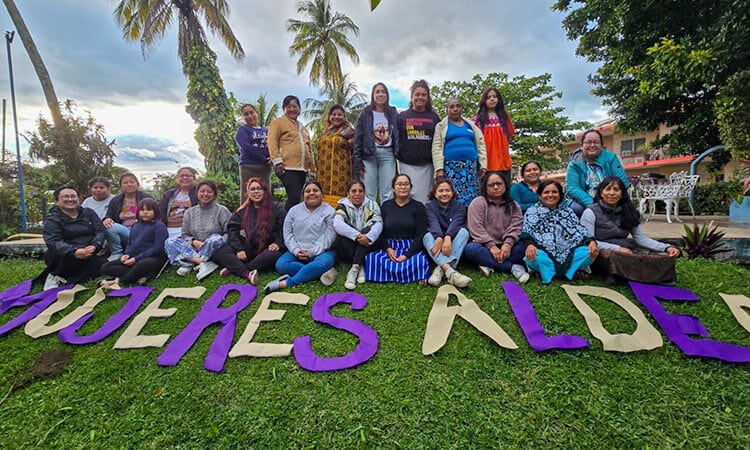When Mexico gained independence from Spain in 1821, there were many different groups living on its land: Indigenous Peoples, Afro-Mexicans descended from enslaved Africans, Spanish descendants, and Spaniards. To form a cohesive nation, they all became unified as Mexicans. But not all Mexicans have been treated equally.
Under Spanish colonial rule, native peoples were expected to conform to the Spanish language and their religious customs. Indigenous Peoples were not allowed to speak their native languages or practice their religions, though many continued to carry out their traditions anyway. And until recently, the Mexican constitution recognized Indigenous people only as Mexican under the law. This has led to Indigenous communities being overlooked and underserved by Mexico’s government for generations.
But Indigenous Peoples are fighting for this to change. Last year, AJWS grantee Alliance for Self Determination (ALDEA), a collective of 210 Indigenous and Afro-Mexican organizations spread throughout nine regions of Mexico, saw an opportunity to advocate for broader rights for Indigenous Peoples. In September 2024 their coalition won a critical victory advancing the rights of Indigenous and Afro-Mexican peoples when the Mexican government approved a new reform to the country’s constitution. The constitution will now legally recognize Indigenous and Afro-Mexican communities in Mexico as subjects of public law, giving them the ability to receive and self-direct federal funding.

For example, while Indigenous children may historically have had the right to a public education, there may not be a school accessible in their community or teachers who speak the native language; their school might be underfunded and structurally inadequate; or they may not have a way to get there. With this constitutional reform, Indigenous communities will have more autonomy to where federal funding goes — be it to education, infrastructure or beyond.
“Indigenous Peoples can provide the solutions based on their own problems. At the end of the day, the communities themselves are the ones who know how they live, they know how they are, they know how to solve conflicts,” says Daniel Moreno, a lawyer and coordinator of the Indigenous rights program at SERMixe, one of ALDEA’s member organizations. SERMixe supports Indigenous Peoples’ rights in Oaxaca, Mexico, where they make up 70% of the population. Nearly 80% of Oaxaca’s municipalities are governed by Indigenous communal law.
Historically, federal funding used to only go down to the municipal level, and not to the communities that composed that municipality. This constitutional change formally recognizes Indigenous community leadership by the Mexican government, allowing them to vote communally on how to allocate their new federal funds. Now that Indigenous communities can receive funding directly, they have greater autonomy to define their own priorities.
ALDEA activists keep up the fight for Indigenous rights
ALDEA gained the momentum to help pass the constitutional reform by conducting preparatory sessions with different regional chapters of ALDEA to understand the unique challenges and demands of the Indigenous groups in those regions. ALDEA members then drafted proposed language for the draft bill, advocating with key policymakers and elected officials; they mobilized local communities, academics, and international human rights bodies; and spread awareness through radio, print, social media, community meetings and public forums.

While the reform is an important and historic accomplishment, the work is not yet done. Daniel says that while this is a great gain and opportunity for Indigenous Peoples, the reform will not be effective if communities don’t know how to make full use of their rights. Daniel’s role as a lawyer is to help translate the legal text of the law into more accessible language, so everyone can understand both its potential and its limitations and can continue fighting and advocating for themselves.
“My grandmother doesn’t have social media,” Daniel explains. “How can we bring this information to people like her, to the communities, so that they can understand and strengthen what they already have? Before their rights were not recognized, but now they have them and they must be informed so they can do what they decide to do.”
He believes more advocacy is required to reach every Indigenous person and ensure they know their rights and how to use them for their benefit. ALDEA will continue fighting to make the rights recognized in the constitution an everyday reality for people in Mexico.
“We are not alone,” Daniel says. “The rights of Indigenous Peoples are recognized, and the protection of defenders is recognized. Our rights are a reality. I believe that little by little we are going to have and achieve the rights that have been denied to us.”
